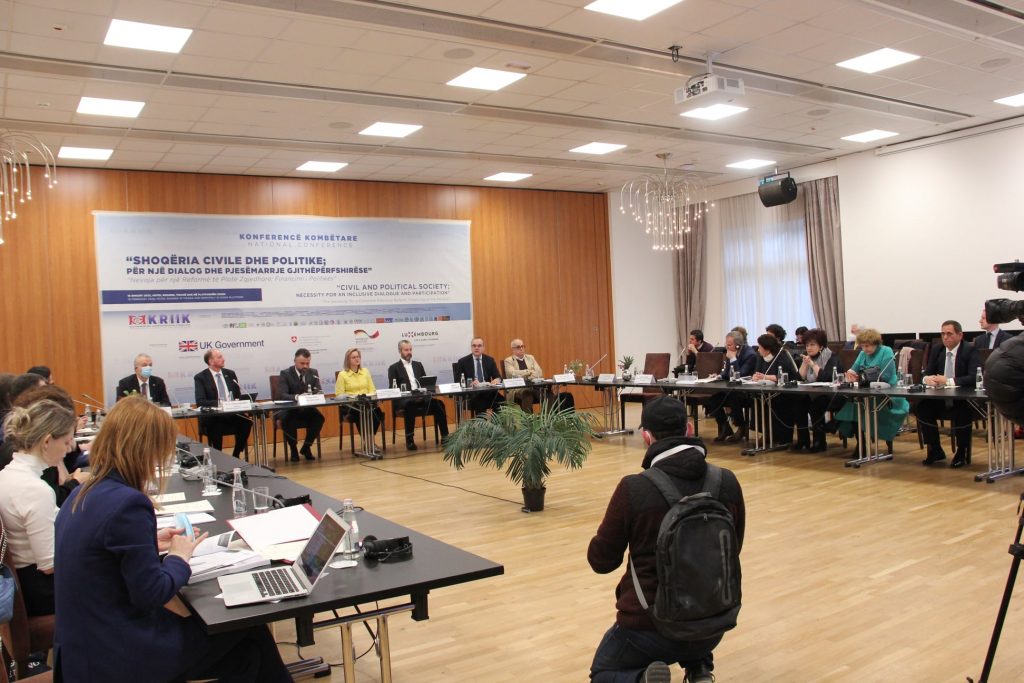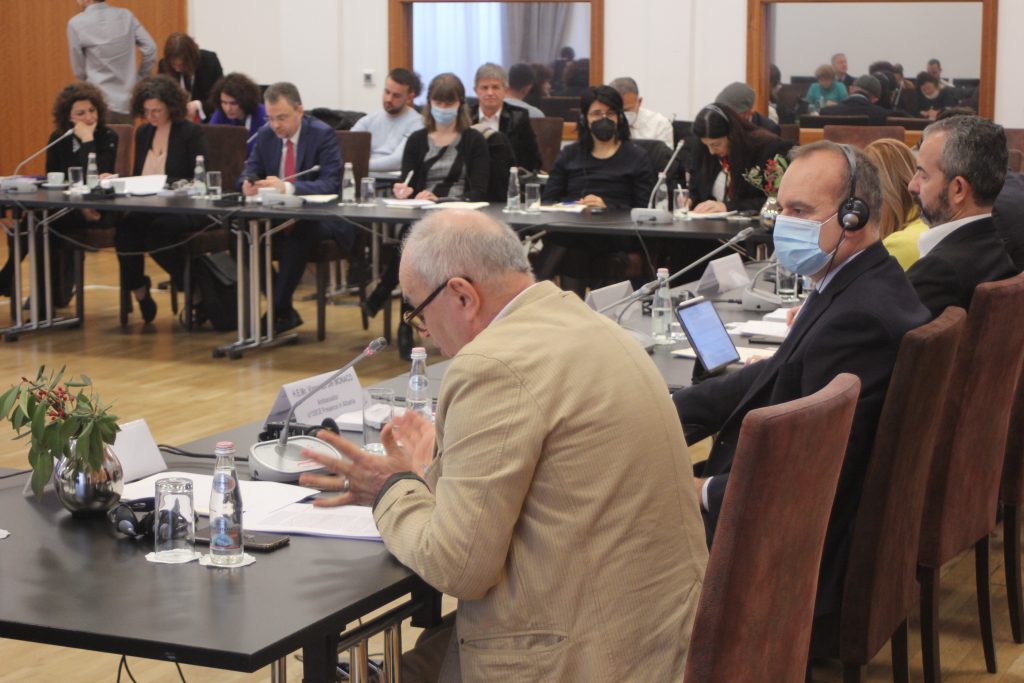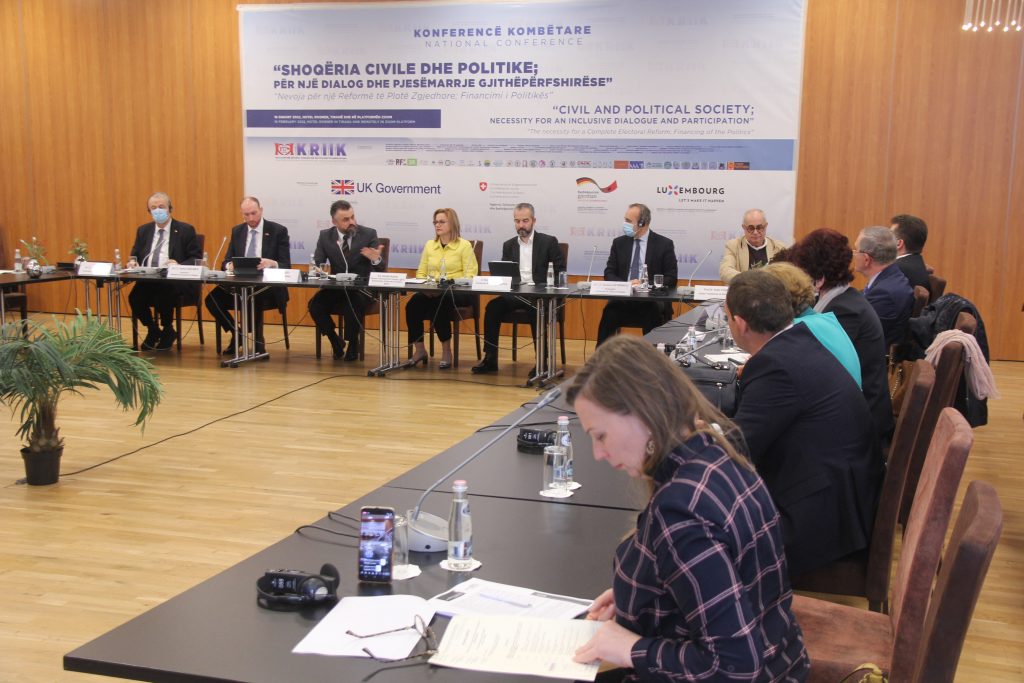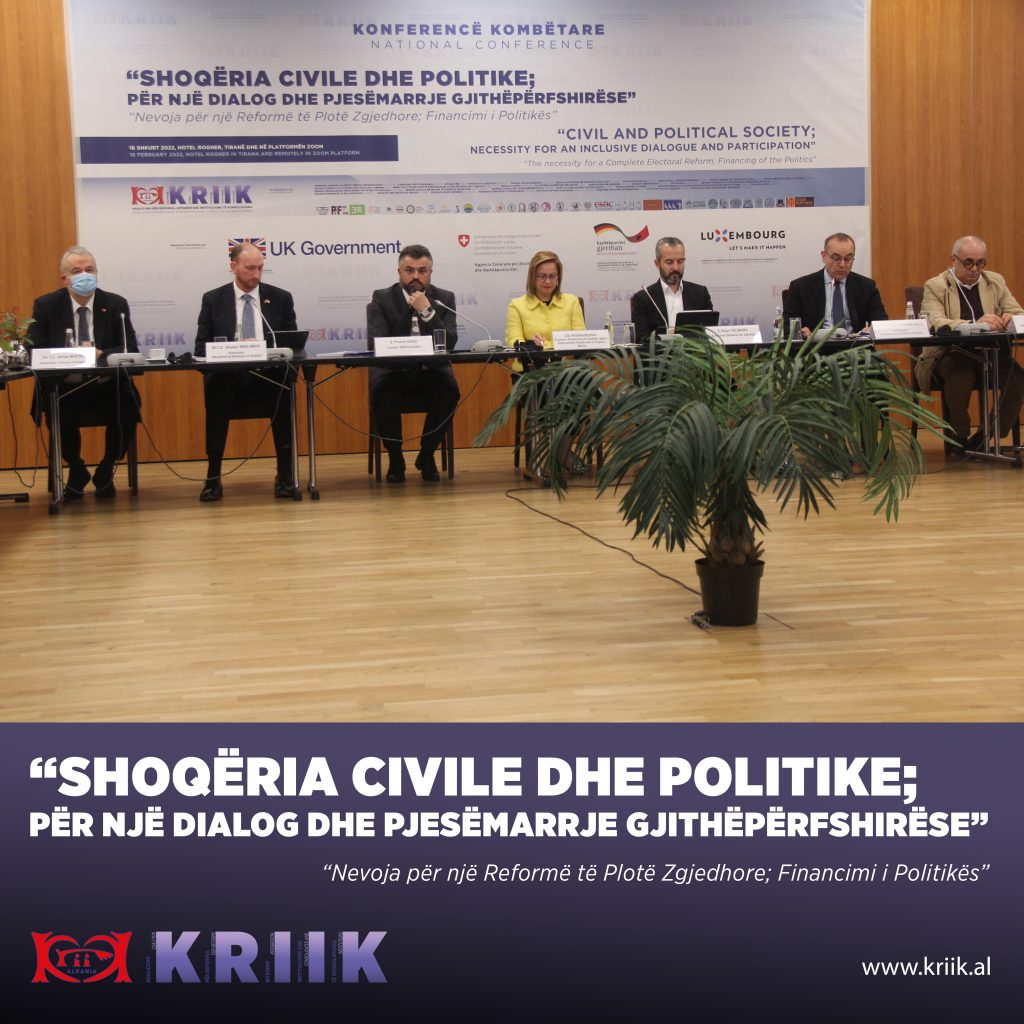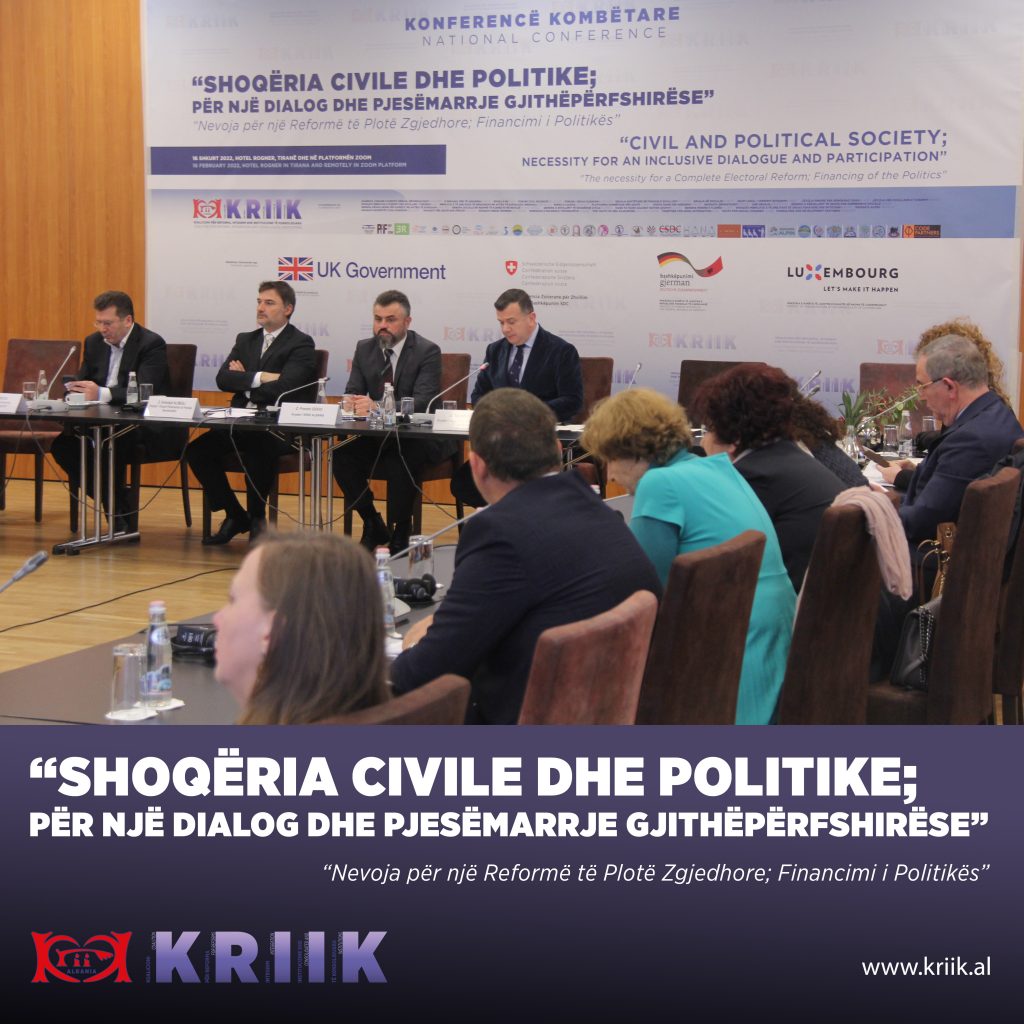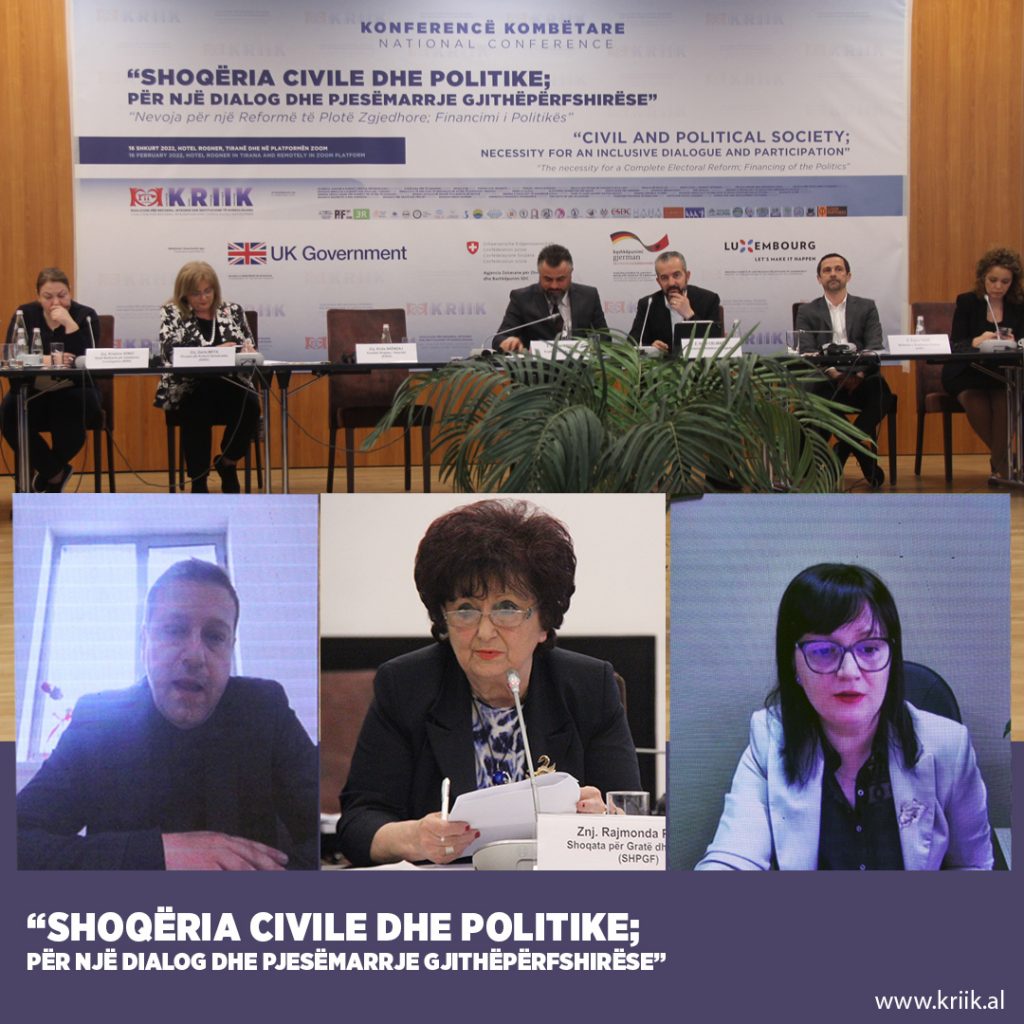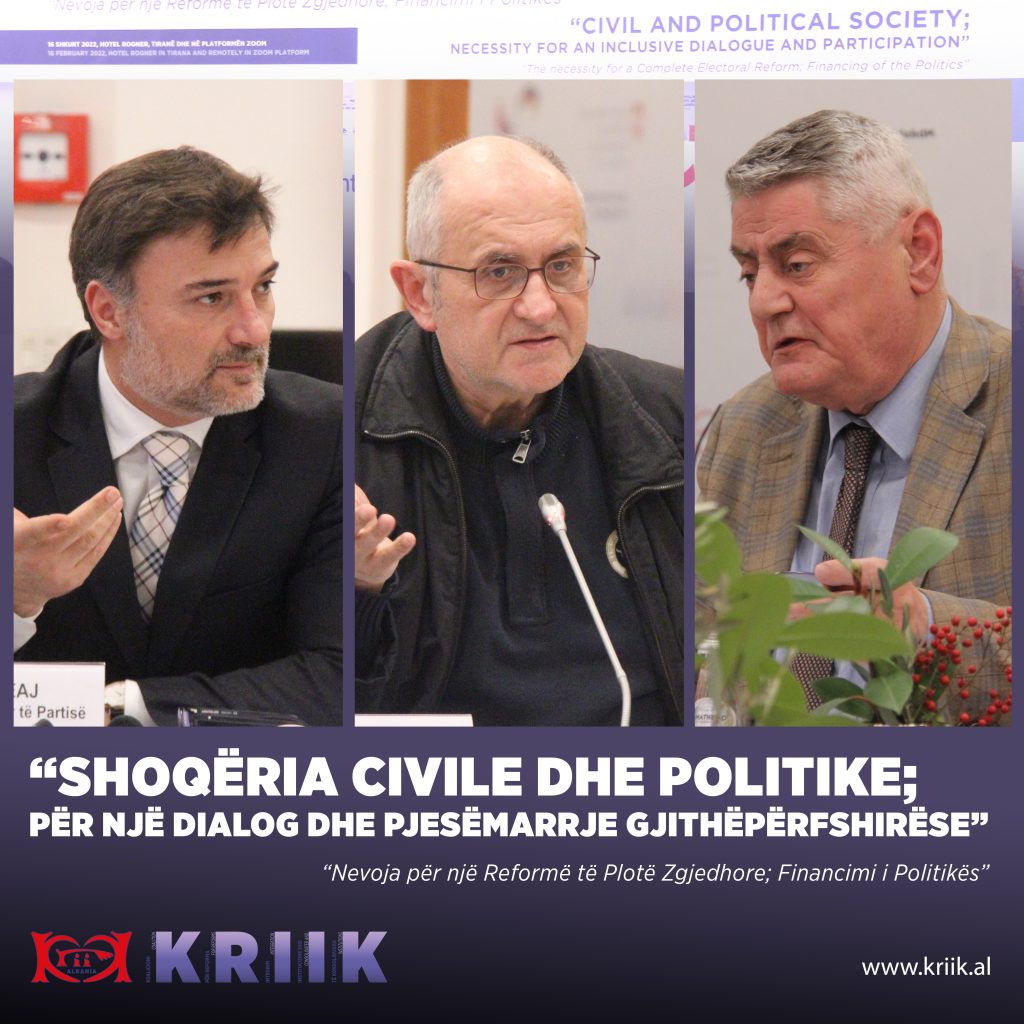“CIVIL AND POLITICAL SOCIETY; NECESSITY FOR AN INCLUSIVE DIALOGUE AND PARTICIPATION” – “The necessity for a Complete Electoral Reform; Financing of the Politics”
Hotel Rogner in Tirana and remotely
On 16 February 2022, from 10.00 – 16.30
The Coalition for Reforms, Integration and Consolidated Institutions held yesterday the National Conference “CIVIL AND POLITICAL SOCIETY; FOR A COMPREHENSIVE DIALOGUE AND PARTICIPATION” – “The need for a Complete Electoral Reform; Financing of Politics”
The conference aimed to return to the attention of institutional and political actors, but also to all Albanian citizens, the need for permanent dialogue, as a chance to restore citizens’ trust in the democratic system and the democratic future of the country. A dialogue that should ensure meaningful inclusion and participation, built on well-defined standards and principles, making it not only an opportunity to leave behind the political crisis, but also to ensure a functioning democracy.
The conference brought together representatives of the main political and institutional actors in the country, especially the Albanian Parliament, to present their political will on the need for integrity of the elections, with special emphasis on political finance. Senior diplomatic representatives of the country’s strategic international partners also attended the Conference, to present their will to help develop democracy in Albania. Other participants in the Conference were representatives of civil society, political parties, academia, media experts, journalists, etc.
The first session was dedicated to the need to continue a permanent dialogue in the face of the challenges that the country faces, embodied, first, in concrete institutional commitments to ensure electoral integrity, undertaking a comprehensive reform of the legal framework, especially in relation to political finance. In this section, the Chairwoman of the Law Commission, Ms. Klotilda Bushka, delegated by the Speaker of the Assembly of Albania, stressed the need to return integrity to the electoral process. Representatives of the diplomatic corps accredited in Tirana, spoke after Ms. Bushka. The Ambassador of the United Kingdom, Mr. Alastair King-Smith, underlined the importance of achieving electoral reform through a comprehensive process, with the necessary participation of civil society. The Ambassador of Switzerland, Mr. Adrian Maitre, highlighted the need to end the practice of misuse of state resources and voter influence, and to conduct a comprehensive electoral reform. The OSCE Ambassador, Mr. Vincenzo del Monaco, welcomed the establishment of the Ad Hoc Parliamentary Committee for Electoral Reform, which he said was fundamental to electoral reform. Member of the Academy of Sciences, Prof. Dr. Artan Fuga, in his speech at the end of the first panel, stressed that the vote is free but distorted. It is uncontrollable by the will of the voter thus losing its authentic value.
The Second Session focused on the engagement of the parliamentary groups of the Assembly of Albania, through their leaders, in addressing the upcoming challenges in the current legislature of the Assembly. Speakers at the Second Session, representatives of the main parliamentary parties, highlighted the importance of agreement and inclusiveness in the Ad Hoc Parliamentary Committee for Electoral Reform. The Chairman of the Parliamentary Group of the Socialist Party, Mr. Taulant Balla stressed that the election commissions should be depoliticized and the diaspora right to vote should be guaranteed. The Chairman of the Parliamentary Group of the Democratic Party, Mr. Enkelejd Alibeaj, pointed out that one of the challenges of civil society is not only commitment and participation, but also the courage to provide solutions. While the Chairman of the Parliamentary Group Alliance for Change and Chairman of the Republican Party, Mr. Fatmir Mediu, underlined that the electoral reform should be implemented as soon as possible, through a comprehensive process, and without being influenced by the major parties.
The third session focused on the findings of civil society organizations that have observed the last elections, with a particular focus on campaign finance. A special place in this Session was taken by the State Commissioner for Elections, who stressed that the CEC should have a voice in the Electoral Reform for every technical and organizational aspect of the process, on which the CEC has a role.
Representatives of civil society organizations engaged in monitoring elements of the electoral process, highlighted the problems that accompanied the recent electoral process, especially in terms of funding, emphasizing the importance of a comprehensive electoral reform, where civil society must necessarily be present.
In the second part of this session, representatives of important international organizations with expertise in election issues, especially in the field of political finance, gave their perspectives on addressing the problems observed and those presented by local actors, based on experiences. and international standards.
The last panel was attended by members of the Electoral Reform Commission from the Democratic Party, the Socialist Movement for Integration, and the Movement for National Development, who highlighted the importance of changes in the legal framework governing the financing of political parties and committed to reflect openness to the participation of civil society and a comprehensive review of the legal framework for elections.
Download the Conference program HERE
